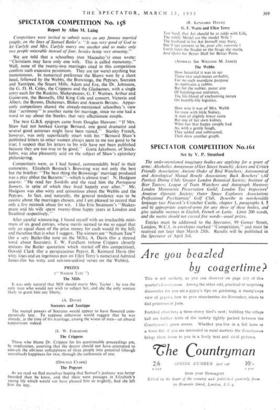SPECTATOR COMPETITION No. 158
Report by Allan M. Laing Competitors were invited to submit notes on any famous married couple, on the lines of Samuel Butler's: "It was very good of God to let Carlyle and Mrs. Carlyle marry one another and so make only two people miserable instead of four, besides being very amusing."
We are told that a schoolboy (not Macaulay's) once wrote: "Christians may have only one wife. This is called monotony." Well, none of the twenty-two marriages cited in this competition confirm such excessive pessimism. They are (or were) anything but monotonous. In numerical preference the Shaws won by a short head, followed by the Webbs, the Brownings, the Pepyses, Socrates and Xantippe, the Stuart Mills, Adam and Eve, the Dr. Johnsons, the G. D. H. Coles, the Crippens and the Gladstones, with a single entry each for the Ruskins, Shakespeares, G. F. Wattses, Arthur and Guinevere, the Boswells, Old King Cole and consort, Victoria and Albert, the Byrons, Dickenses, Blakes and Aneurin Bevans. Appar- ently competitors shared the already-mentioned schoolboy's view that "acrimony" is another name for marriage, since no one had a word to say about the Steeles, that very affectionate couple.
The best G.B.S. epigram came from Douglas Hawson: "If Mrs. Shaw had not hooked George Bernard, one good dramatist and several good actresses might have been ruined." Stanley French, however, was only superficially smart with his "Bernard Shaw's published letters to other women always seem to me too good to be true; I suspect that his letters to his wife have not been published because they are too true to be good." Greta Jakobson, of Stock- holm, was also pleasantly acid on the subject of Shaw's epistolary philandering, Competitois were, as I had hoped, commendably brief in their comments. Elizabeth Bostock's Browning was not only the best but the briefest: "The best thing the Brownings' marriage produced was a play abbut the Barretts"—which is almost true! N. Hodgson asserts: "He read her Sordello and she read him the Portuguese Sonnets, in spite of which they lived happily ever after." Mr. Hodgson was also witty and censorious about the Webbs and the Pepyses. In fact, and naturally, the general tendency was to be caustic about the marriages chosen, and I am pleased to record that only a few mistook abuse for wit. I like Eric Swainson's "Shakes- peare and his wife spent twenty-three happy years in London and Stratford respectively."
After careful winnowing, I found myself with an irreducible mini- mum of six good entries, whose merits seemed to me so equal that only an equal share of the prize money for each would fit the bill; and therefore that is what I suggest. The winners are "Nahum Tate" (for a very Butler-like note on the Mills), A. Davis (for a shrewd word about Socrates), E. W. Fordham (whose Crippen cleverly imitates the Butler quotation which started off' this competition), Oswald Clark (for a perspicacious Pepys), R. Kennard Davis (for witty lines and an ingenious pun on Ellen Terry's name)and Admiral James (for his witty and not-too-unkind verses on the Webbs).
PRIZES
(` NAHUM TATE '')
The Mills
It was only natural that Mill should marry Mrs. Taylor : he was the only man who would not wish to subject her, and she the only woman likely to grant him any liberty.
(A. Davis) Socrates and Xantippe The mental powers of Socrates would appear to have flowered com- paratively late. To suppose otherwise would suggest that he was already, at the time of his marriage, among the wisest of men—an absurd supposition indeed.
(E. W. FORDHAM) The Crippens
Those who blame Dr. Crippen for his questionable proceedings are, by implication, asserting that the doctor should not have-attempted to convert the obvious unhappiness of three people into potential (though unrealised) happiness for two, through the euthanasia of one.
(OSWALD CLARK)
The Pepyses
As we read we find ourselves hoping that Samuel's jealousy was better founded than he knew, and that there were passages in Elizabeth's young life which would not have pleased him so mightily, had she left him the key.
(R. KENNARD DAVIS)
G. F. Watts and Ellen Terry
Too hard, that Art should be at odds with Life, The wifely Model not the model Wife ! The husband in his Art himself may bury, She'll n9t consent to be, pour elle, enterree Forth from the Studio to theStage she starts, And Quits her Better Half for Better Parts.
(ADMIRAL SIR WILLIAM M. JAMES)
The Webbs How beautiful it was to see Those two soul-mates co-habit, For no such mundane purpose As motivates a rabbit.
But for the nobler, purer aim Of hatching-out statistics, The life-blood of enchanting tomes On humble-life logistics.
How wise it was of Mrs. Webb To mate with little Sidney, A man of slightly lower caste But one of her own kidney. What fun that happy couple had As, with a gentle laugh, They added and subtracted, Then drew another graph.


































 Previous page
Previous page